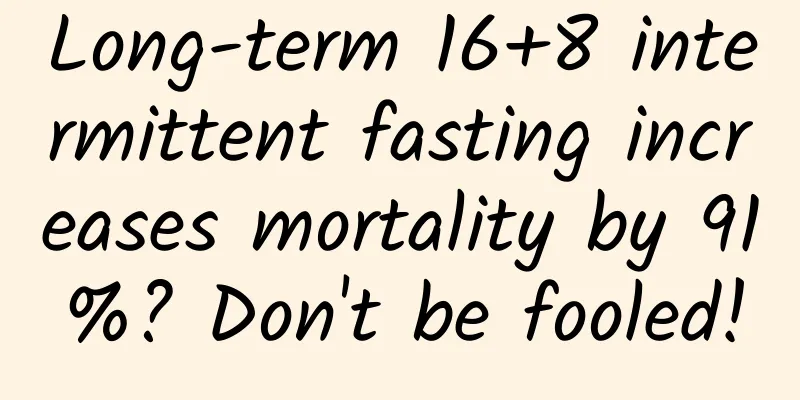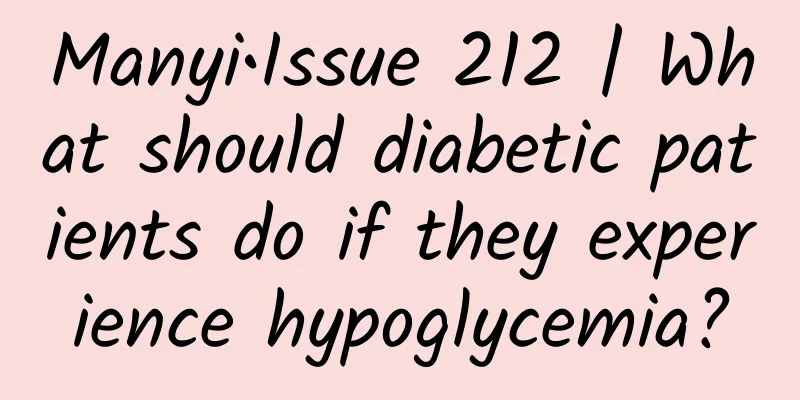Long-term 16+8 intermittent fasting increases mortality by 91%? Don't be fooled!

|
The "16+8" diet is a method of weight loss and fat reduction that many young people on the Internet have tried in recent years. Specifically, it means: control your daily eating time within 8 hours (for example, eat breakfast at 9 am and finish dinner before 5 pm), and fast for the remaining 16 hours, you can control your weight. Image source: A social platform However, at a recent conference held by the American Heart Association, a study from Professor Zhong Wenzhe's team at Shanghai Jiao Tong University School of Medicine pointed out that people who control their eating time within 8 hours can increase their risk of death from cardiovascular disease by 91%. Image source: A social platform Once the results were reported by the media, they sparked a huge discussion on social media. Is the 16+8 diet really unhealthy and even increases the risk of cardiovascular death? Let me give you the answer first: Not necessarily! The controversy stems from The public’s misinterpretation of new research In terms of research purpose, these researchers wanted to know whether long-term adoption of the "16+8" diet plan would have potential effects on human health. To do this, they analyzed data from the National Health and Nutrition Examination Survey (NHANES) of the United States from 2003 to 2018 (an annual sampling survey of the eating habits of 5,000 people), and compared them with data on deaths in the United States from 2003 to 2019. Overall, the study was large in scale, with data from about 20,000 American adults included. In the first year of participation in the survey, they completed two questionnaires about their diet. They then underwent long-term follow-up, with a median follow-up time of 8 years and a maximum of 17 years. The analysis found that people who limit their eating time to 8 hours a day have a 91% higher risk of death from cardiovascular disease. For those who already have cardiovascular disease, even if the eating time is extended by an additional 2 to 10 hours, the risk of death from cardiovascular disease or stroke will still be 66% higher. The results also show that the "16+8" diet plan, which is generally considered "healthy", does not actually reduce the risk of all-cause mortality. On the contrary, if the daily eating time is extended to 16 hours, and eating can be done outside of 8 hours of sleep, then the risk of cancer death in cancer patients is reduced. At present, some people on the Internet have only cited the above conclusions, which seems to imply that the popular "16+8" diet plan is not only not beneficial to the body, but may be harmful. This interpretation may be one of the reasons why the results of this study have caused such a big response. For similar new research The public needs to interpret with caution In fact, in addition to the general public's concern about this news, the biopharmaceutical industry has also had a lot of discussions about this research. The results of the discussions tend to believe that there are some uncertainties about this "observational study" and that the public's current interpretation may be too simplistic and crude. Copyright images in the gallery. Reprinting and using them may lead to copyright disputes. For example, when this news went viral on the Internet, those who were more serious would find that the only source of the news was a press release. The complete data of the study itself had not yet been officially released at the conference, so well-known medical journalists such as Matthew Herper questioned whether many people had not studied the original data when publishing these news to attract attention. First of all, when it comes to surveys on lifestyle habits, we need to be aware that not everyone will answer questions rigorously. For example, some people may not remember exactly how much they ate or when they ate. In short, human uncertainty means that we cannot 100% trust the results of the questionnaire. The bigger problem is that the people who give different answers may have big differences in themselves. For example, those who decide to adopt the "16+8" diet plan may have concerns about their health. Or, people who can stick to the "16+8" diet plan for a long time may have different metabolic levels from others. In short, different populations are not randomly assigned, and there are various complex factors to consider behind them. Scientific research is a long process From a rigorous point of view, the results of this study cannot prove that the "16+8" diet plan is harmful to the body, nor can it tell us whether the "16+8" diet plan is good or bad. A more rational statement should be that these research results make us realize that the current scientific community still has some shortcomings in its understanding of the "16+8" diet plan. We should conduct more research to understand the biology behind it, so as to guide the development of a lifestyle that is more beneficial to human health. A classic example is perhaps the spiral of knowledge about "fish oil". In the early years, people found that the Inuit people had almost no heart disease, and attributed the reason to their eating habits - the Inuit people eat a lot of fatty fish at every meal, and these fish oils may be a protective factor. This observation is certainly not rigorous, so scientists have done a lot of research, including randomized clinical trials. These studies did not give a clear answer at first, and even found that fish oil does not protect the heart. It was not until a more rigorous clinical trial using high-purity fish oil that this protective effect was observed. Even so, some have questioned whether the placebo used in this study increased the risk of cardiovascular disease. In other words, it was not the fish oil that had a protective effect, but it was compared with a worse placebo. In short, scientific research on a phenomenon often requires a long and extensive process and requires argumentation from multiple parties. Especially when it comes to the field of health, it needs to be treated with caution. In order to get a clearer and more reliable conclusion, perhaps we need to wait for more years, but it will all be worth it in the end. References [1] 8-hour time-restricted eating linked to a 91% higher risk of cardiovascular death, https://newsroom.heart.org/news/8-hour-time-restricted-eating-linked-to-a-91-higher-risk-of-cardiovascular-death [2] A study says intermittent fasting is making people drop dead. Oh, come on, https://www.statnews.com/2024/03/19/intermittent-fasting-study-heart-risk/ Planning and production author: Ye Shi Popular Science Creator Review丨Zhang Yu, Researcher, Chinese Center for Disease Control and Prevention, Doctor of Medicine |
<<: Can everyone undergo myopia surgery? What should we pay attention to?
>>: Can low-degree myopia cause retinal detachment?
Recommend
School is about to start. At what degree of myopia does my child need to wear glasses?
School is about to start, and many parents are as...
Treatment for heel pain during confinement
I believe that all of us have experienced heel pa...
Can garlic cure gynecological diseases?
Among gynecological diseases, the most common one...
What to do if a woman has a big vagina
In fact, both men and women have reproductive org...
What can I eat to enlarge my breasts?
Are you still worried about your flat chest? Is i...
Can I eat chocolate during menstruation? What are the effects?
Chocolate contains high energy and sugar, and is ...
What happens if you take birth control pills?
Everyone knows that women are very weak during me...
Can I drink red wine when eating barbecue? How to grill seafood deliciously?
I am still afraid of getting fat when eating barb...
Is it normal for a pregnant woman’s body temperature to be less than 36 degrees?
Generally speaking, body temperature is very impo...
Women sweat after waking up
More and more people often experience night sweat...
How to choose BB cream color? Which color of BB cream is suitable for which people?
BB cream basically combines the functions of foun...
How to relieve sagging breasts after childbirth?
In fact, many women who have just given birth hav...
Biparietal diameter and femoral length standard at 30 weeks of pregnancy
The 30th week of pregnancy is the stage when the ...
Will abortion lead to infertility?
Everyone knows that many women are prone to unexp...
These terrible gynecological diseases are most likely to be "hidden" in women
Women should be wary of some hidden gynecological...




![[Medical Q&A] Can toothpaste cause allergies?](/upload/images/67f0f1d9a43b8.webp)




